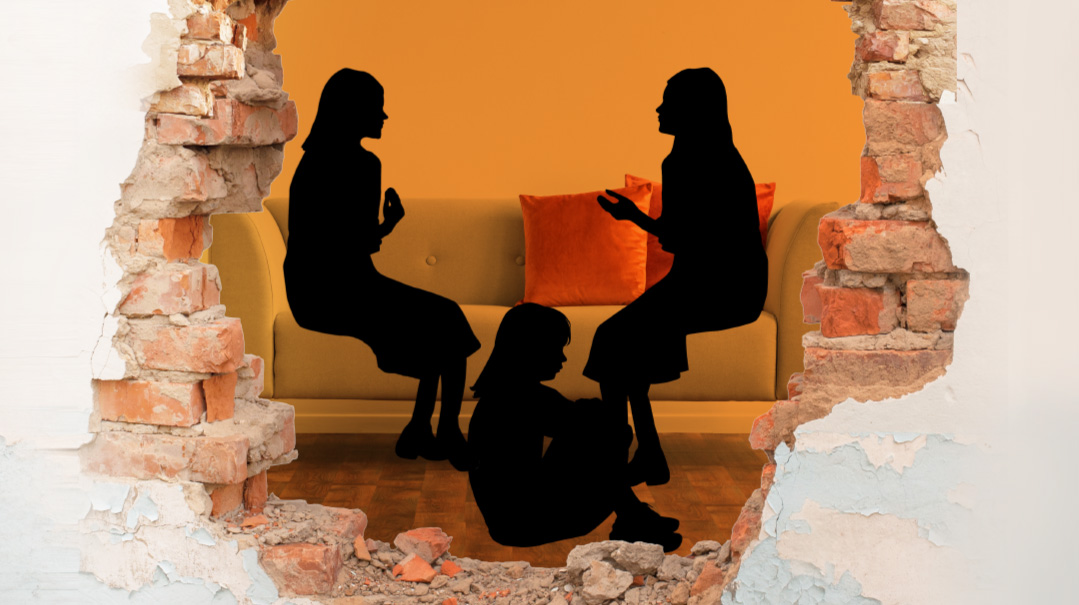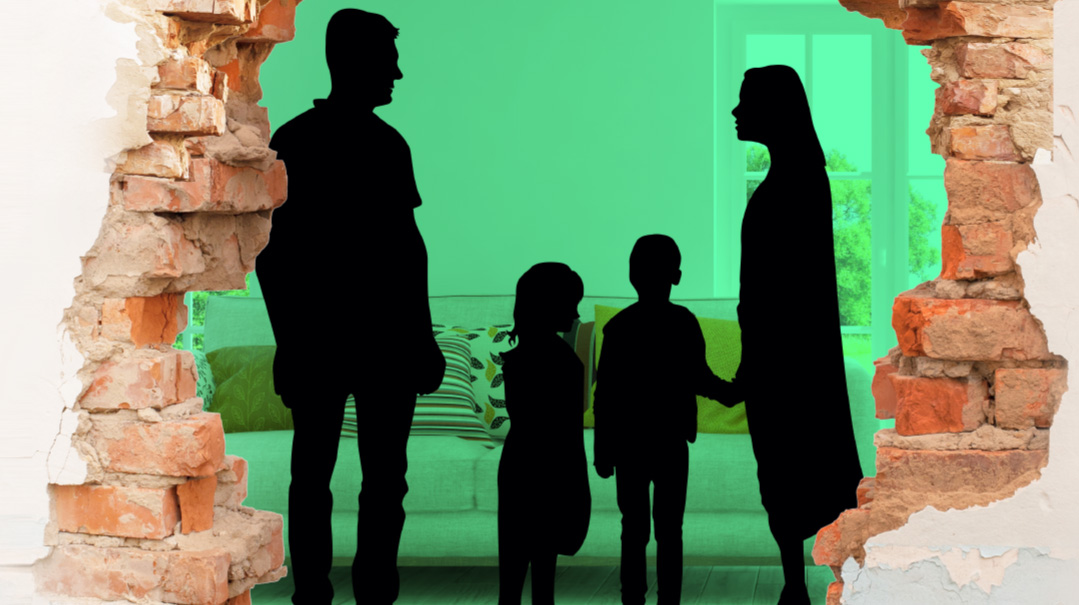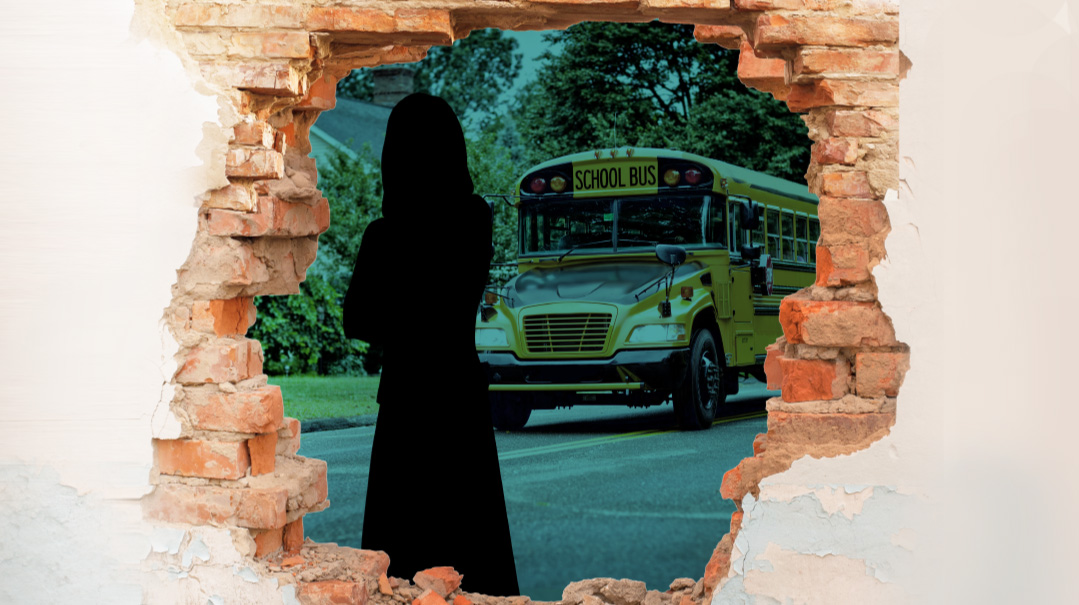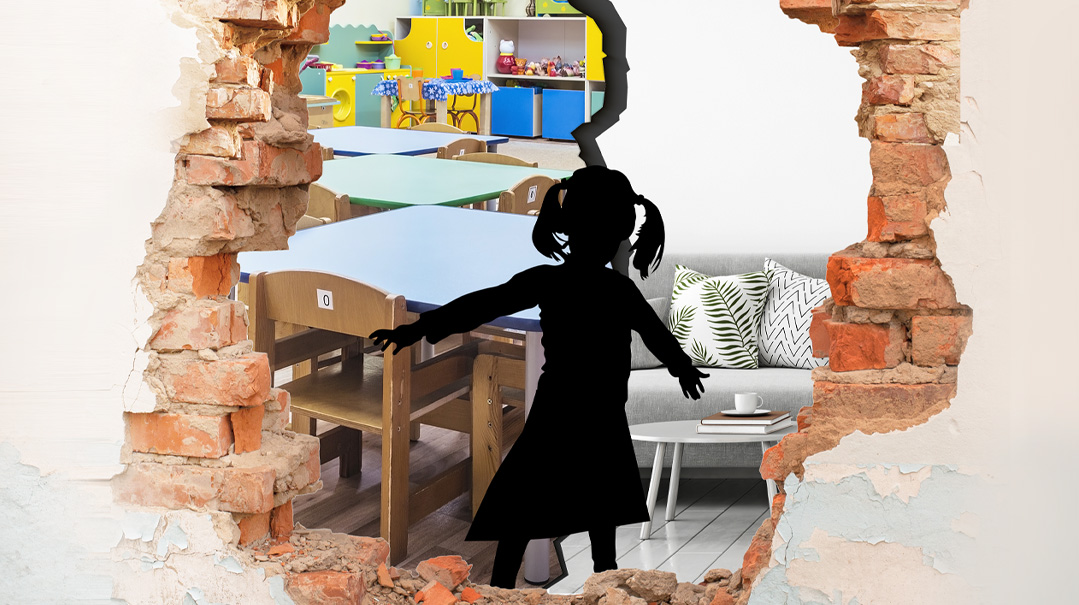“Can I Censor the Speech of My Daughters-in-Law?”

“I’m still the mother here, and I prefer my daughter not be exposed to these topics at such a young age”

Most of my children are married, and I have plenty of grandchildren, kein ayin hara. My youngest child is a ten-year-old girl. Generally, I love the dynamics of a multigenerational family. But lately there’s an aspect that has been bothering me.
When I host my married children, they inevitably get into discussions about shidduchim, pregnancies, and other topics I feel shouldn’t be discussed in front of my youngest daughter, who is precocious and perceptive. While it’s mostly my daughters-in-law doing the schmoozing, I mentioned something to one of my married daughters, and she told me to relax, saying things are different now than when she was growing up, and that kids today know everything.
Whether or not that’s true, I’m still the mother here, and I prefer my daughter not be exposed to these topics at such a young age. As it is, I’m concerned about how much she’s already heard and how this will impact her in the future.
However, most of the schmoozing is being done my daughters-in-law. I’ve made subtle comments, but they were either missed or ignored.
Is there an appropriate way for me to censor the speech of my daughters-in-law? Is this worth getting direct and blunt when that will probably strain the relationship, or should I let this pass and try to do damage control afterward?
Yitti Bisk has been teaching kallahs and mentoring women for over 30 years.
Wow! As a mother of a multigenerational family, I empathize with your situation. On one hand, this is your “baby,” and you want to protect her. On the other hand, she’s living in a home frequented by adults.
There are two parts to this question. The first is your concern for your astute ten-year-old daughter.
Whether you’re firmly ensconced in a homogenous, super-yeshivish neighborhood or not, your daughter is likely to learn things you want to shield her from, things she may not be able to comprehend in a healthy way at her stage in life. The best place for her to get her information before she’s exposed to it from a random source is… you.
If you don’t already have an open, safe, and loving relationship with your daughter, then now is the time to cultivate one. You want a dynamic in which she feels comfortable asking you questions and you feel comfortable answering them.
Uncomfortable speaking about things “we don’t speak about in public”? This is a good time to reach out to your rav, rebbetzin, kallah teacher or mentor for advice on what to say and how to say it.
I’ll bet you have a special relationship with your “mezinke.” My guess is that she still enjoys spending time with you and hasn’t reached the eye-rolling stage. Find a quiet time when it’s just the two of you (car rides are perfect) to have a casual conversation.
“Zeeskeit, it must be hard sometimes to be living with lots of adults who have ‘adult’ conversations… if you have any questions, you can always ask me privately later, and I’ll do my best to answer you.”
Your daughter will soon be noticing signs of puberty, so this is a good time to start a conversation about her growing up. Now that you’ve initiated the conversation, she’ll be more likely to come back to you with her questions. When she does ask you a question that makes you hyperventilate, you can say, “Hmm… that’s a great question. I don’t have an answer now, but I’ll find out for you.” And pick up the phone to your mentor.
There are terrific books (such as The Wonder of Becoming You by Dr. Miriam Grossman) and even courses (Elisheva Liss’ Sacred Not Secret) that are good sources of information.
The next part of this issue is between you and your married children and in-law children. Let’s assume for a moment that these conversations are appropriate for adults. Your daughter is correct that, for better or for worse, we live in a far more open society. (My mother always says, “It’s a new world.’’)
Your kids see nothing wrong in speaking about shidduchim/pregnancies/whatever. They have a right to their opinion. I’ll even bet they know what you think about these conversations.
But do they know how it affects you? I believe many adult children see their parents/in-laws in a two-dimensional way, through the lens of their relationship (or lack thereof) with them. In that view, your hints either don’t register or are taken as criticism.
So, how can you be direct without being blunt?
I’d like to share an approach that helps create an atmosphere of mutual respect. Keep the discussion away from right and wrong, but rather focused on your feelings. If you have a good relationship with your daughters-in-law, you can try to speak to them privately, keeping the following points in mind:
Put a positive spin on the facts: “Devoiry, I love how you kids get along so well and enjoy each other’s company.”
Describe your feelings about the issue, not their actions: “It makes me feel uncomfortable when the conversation turns to pregnancies around Toby — she’s all ears. I think she’s not ready for these conversations.”
Request respectfully: “Would you please change the subject when she’s around? It’s important to me. Thank you!’’
Or even better, try it this way:
Ask for her input: “I’m not sure of the best way to deal with this. What do you suggest?” (You’ll be surprised at her creative solutions, and you’ll have her on board.)
At the end of such a conversation, recognize you did a great job. Devoiry heard you — and still thinks you’re the best mother-in-law on this side of the equator. I’ll bet you are.
Shifi Lieberman, LMFT is a marriage and family therapist. She writes a popular weekly newsletter “Socially Appropriate-ish!” and created two virtual courses, Social Skills Made Simple & Anxiety Made Simple with the goal of keeping children, adults, and families out of therapy.
Great question! This is why I believe that daughters-in-law should be muzzled and only speak when permission is given by their mother-in-law.
Joke. For those of you who don’t get my humor (yet).
Your question is about values, the process of communication, boundaries, and family dynamics. Let’s break it down.
For starters, I really understand your question. It’s hard to parent children who are at different ages and stages. However, I think most people (not just family therapists) would agree that causing tension with your daughters-in-law is never advisable. It’s one of the most precious and delicate relationships. Don’t confuse being “direct and blunt,” which can be hurtful, with being “open and honest,” which can be loving, and deepen connection.
Chances are, your daughters-in-law aren’t ignoring you. Rather, they’re probably not understanding your “subtle comments” because they’re not used to this form of communication. They were likely raised differently in terms of communication styles and content.
It seems you’re a more formal person, with more careful boundaries. And possibly, you may have a harder time with open and honest communication in general. I also infer that your older daughter might not have appreciated you protecting her from these types of open conversations. She dismissed you by telling you to “Relax.”
Her words are so powerful: “Relax, things are different than when we were growing up. Kids nowadays know everything.” I believe, based on your daughter’s tone, that she was thinking, but not saying, “Unlike how I grew up, because you never shared anything with me.”
I don’t think it’s a coincidence that your daughter didn’t feel comfortable saying that out loud to you. Communication styles are often learned. Your daughter may have been offering you a “subtle hint” of critique in precisely the same subtle style you’ve taught her to communicate. Perhaps she’s trying to say to you: “Mommy, it’s okay for my ten-year-old sister to hear this. Trust me, I know from my own experiences.”
It’s important to focus on what’s being said, as well as on what is not being said. Grant her permission to be open and honest by modeling this yourself.
I’ll never forget when a close relative had a sudden pregnancy loss at 20 weeks. When my then 10- and 11-year-old boys saw that I was sad, I told them what happened. People thought I was nuts to share this experience with them. But I considered it a “teachable moment” where I could model for them appropriate sadness, grief, and empathy. I mean, how else should they learn? Three years later I — and by extension, my children — had a similar loss. Our open and honest conversations paid off.
Your question makes me smile. Your home sounds wonderful, fun, and open, where the older children and children-in-law get along and protect each other. They speak openly about real-life topics, whether it’s pregnancy, shidduchim, or anything else. Your ten-year-old should consider herself lucky to have role models of open communication.
Even though everyone draws the line differently as to what’s socially appropriate for children to know at different ages, I firmly believe that children today should be educated at younger ages and from the home – before they end up getting an education outside the home. And since doing this may be hard for you, you may actually want to thank your marrieds for helping you out, even though according to your standards, they truly may be “socially appropriate-ish!”
Yes, you’re the mother. You set the tone — and the boundaries. Your opinion does matter. And that’s precisely why I invite you to jump on the “open communication” bandwagon. It will open up your relationships with your children, and your in-law children. Rather than having an urge to censor speech, you’ll be able to model for your children how to be open and honest with your preferences, resulting in closeness and warmth, rather than any strain and tension.
When people make the effort to communicate more openly, truthfully, and lovingly, they experience relationships they’ve never had before.
You may not even need the muzzle anymore.
Enjoy your nachas!
Dina Schoonmaker is a veteran teacher at Michlalah in Yerushalayim. She gives vaadim for women in Israel (and in the US over Zoom) and lectures internationally.
I understand your dilemma, as there’s a real conflict of interests here. We want to make the atmosphere in our home pleasant and inviting for our sons-in-law and daughters-in-law, and yet at the same time, still feel we’re the baal habayis and have standards we’d like to upkeep. This type of question affects many people as they marry off their children, especially in the areas of tzniyus, use of technology, and standard of living.
Younger children have a tremendous amount of exposure to the world through their older siblings. A rebbi once told me that he could tell very early in the year who has older siblings. It was the jargon they used, their awareness of the world. He wasn’t even talking about anything inappropriate. But he could pinpoint right away, “Now, that’s a kid who has ears and is listening to his older siblings.”
There is a big distinction between a comment that’s truly inappropriate or explicit, and a comment that’s TMI (too much information). TMI is a phenomenon in today’s world, and it’s very hard for us to stop it. A curious child will get his information somewhere else if he’s not getting it at your Shabbos table. We have to accept that it’s very hard to micromanage what a child hears and what he’s exposed to.
The question here is: what is your priority? You’ve hinted to your children a few times regarding your preferred level of censorship, and you’ve even spoken more directly. Yet they’re still not listening to you. So, you have a choice. You can either be very forceful and say, “Look, these are my standards, and whether you agree with them or not, I expect you to abide by them in my home.”
Such a direct approach is the only way you can really put a complete stop to this. But as you implied in your letter, there’s a price you pay if you choose to do this. You can ask yourself: is this “Yatza hefseido b’secharo or secharo b’hefseido,” meaning, you should consider what’s the cost and what’s the benefit? You have to weigh both sides.
My personal opinion would be to drop this. You have to realize that your child is exposed anyway, and at least she’s hearing these things in a Torah home and not obtaining it from other avenues. Just make sure a red line exists so that explicit and inappropriate details aren’t being spoken about publicly. If suddenly the conversation ventures to something completely inappropriate, you can do something like raising your eyebrows and saying, “Censored!”
I have a friend whose husband is a rebbi for OTD kids who are coming back to Yiddishkeit. She has had very explicit and inappropriate things come up at her Shabbos table. She tells her guests, “Listen, I want you to feel comfortable here, but my children are very sheltered. Therefore, if the conversation veers toward something really inappropriate, I’ll make this funny sound, like Bleeeep! and you’ll know what I mean, and you’ll know that I’m censoring this conversation.” She wanted to preempt such a situation before it even occurred, and she did it in a humorous, comfortable way.
The difference here is that her guests were her husband’s students. The energy is completely different than in your situation, where there can be tension when a mother-in-law tells her daughters-in-law what to do.
Hopefully you won’t get into a situation where it’s bad enough to require a censor.
If anything uncomfortable does come up at your table, you may choose to follow up with your younger children and use the opportunity as a springboard to make it safe for them to discuss sensitive topics with you.
I found it fascinating that after a recent public situation that exposed many children prematurely to the concept of suicide, many mothers said that at least it gave them the opportunity to have an open discussion with their children about sensitive topics they may have otherwise not addressed. And the children were relieved to be able to process this safely with their parents, as opposed to being misguided by peers and “the talk on the street.”
You can use these conversations as teaching opportunities.
Wishing you much hatzlachah and nachas!
(Originally featured in Family First, Issue 813)“
Oops! We could not locate your form.







